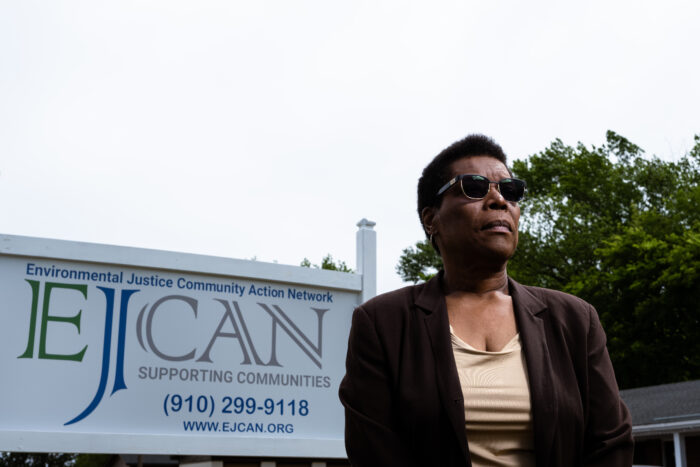From outside North Carolina’s largest landfill
It’s 3 a.m. in the community of Snow Hill when the first round of semi-trucks hauling tons of regional waste come rolling into dump at North Carolina’s largest landfill. The facility operates seven days a week and the smell of the nearly 1,000 acre dump site, which one local describes as a “greasy, oily” smell “like decaying flesh,” permeates the air.
Since its 1973 opening in the mostly Black community of Snow Hill, generations of rural Roseboro residents have faced severe consequences of living near a toxic mega-landfill.
For too long, those in charge of the landfill have shirked responsibility for the health and safety of Snow Hill residents.
Sherri White-Williamson, EJCAN
They protested the Sampson County Landfill’s expansion in 1992. Now, members of this eastern North Carolina community are still fighting numerous forms of pollution from the 1.8 million tons of noxious waste hauled through their streets and processed at the facility every year.
This includes years of exposure to toxic PFAS in their drinking water wells, surface water, and groundwater. Recent testing from the N.C. Department of Environmental Quality confirms unsafe – and in some instances, shockingly high – levels of these toxic forever chemicals in waters surrounding the landfill.

“For too long, those in charge of the landfill have shirked responsibility for the health and safety of Snow Hill residents,” says Sherri White-Williamson, a Sampson County native and executive director of Environmental Justice Community Action Network.
SELC is prepared to take legal action on behalf of EJCAN if the landfill’s owners don’t take accountability for endangering people’s health and the environment. Officially, in a notice of intent sent this week, we ask landfill owner GFL Environmental to stop putting people in danger with its handling, storage, treatment, and disposal of PFAS-contaminated waste. We also ask GFL to investigate, cease, and remediate the PFAS pollution already present.
“All communities deserve clean water,” says Staff Attorney Maia Hutt. “By contaminating the waters that Snow Hill residents depend on, the facility violates the law and further inscribes patterns of environmental injustice that disproportionately burden communities of color with pollution.”
In eastern North Carolina, the same communities poisoned by the landfill are constantly hit with chemicals that include known carcinogens, distressing noises, and rancid odors from various industries that continue to put profit over people.
Hog and poultry operations that generate millions of tons of manure and wood pellet facilities that export trees from Southern forests to Europe dominate the list here, but the pattern of disproportionately dumping pollution on communities of color — primarily Black, Latino, and Indigenous people — is one that persists throughout the South and beyond.
All communities deserve clean water.
Maia Hutt, Staff Attorney
Thriving communities and a healthy environment for all people, regardless of race or wealth, is possible.
From fighting pollution and revitalizing neighborhoods to elevating local voices in decision making, SELC stands alongside all Southern communities as they face outsized industry pollution, dangerous pipelines, and destructive highway expansions.
